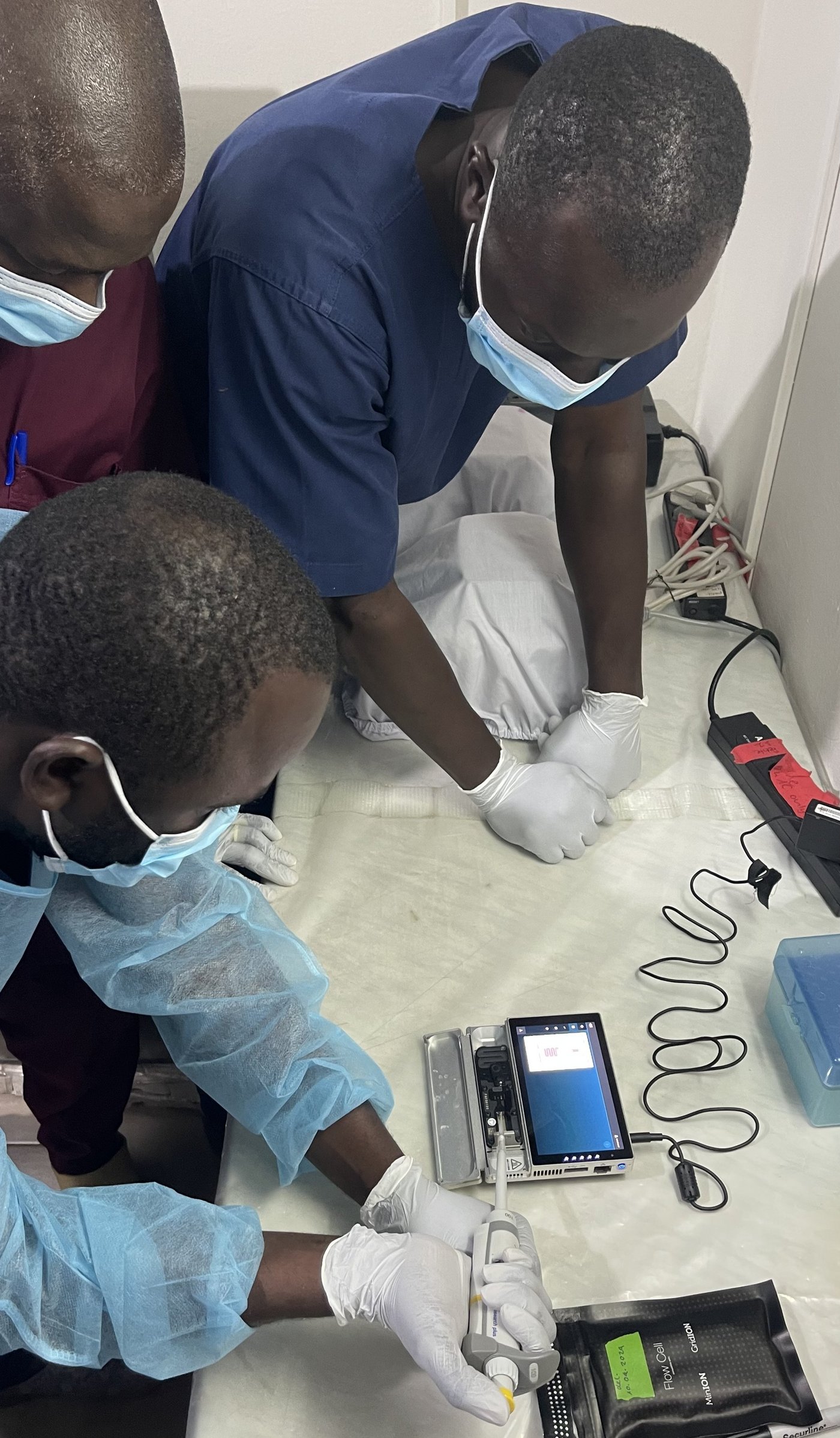First case of Mpox clade IIa in Guinea
Guinea has confirmed its first case of Mpox, marking the country's initial detection of the virus. The case is from the West African clade IIa, which is distinct from Clade Ib responsible for the ongoing outbreak in Central and East Africa. The discovery was made by a laboratory in Conakry, working in collaboration with a group from the Bernhard Nocht Institute for Tropical Medicine (BNITM).
![[Translate to English:] Ein Teammitglied des LFHV-GKD-Labors bearbeitet die verdächtige Probe in der Unterdruck-Glovebox. [Translate to English:] Nahaufnahme zweier Hände in blauen Laborhandschuhen, die gerade Proben in einen gelben Probenständer einsortierne.](/fileadmin/_processed_/0/5/csm_Mpox_Guinea_3_eb73e4de33.jpg)
Never before had there been evidence of Mpox infections in Guinea, although clade IIa has been endemic in West Africa since the 1970s. In recent months, neighboring countries Liberia and Côte d’Ivoire have also reported cases of the same clade. It is now confirmed that this variant is circulating in Guinea as well. The case was first reported on 31 August by the laboratory of Mr. Fara Raymond Koundouno in Gueckédou: a 7-year-old girl from Macenta prefecture who presented with typical Mpox skin lesions.
Subsequently, the Centre de Recherche en Virologie (CRV) led by Prof. Sanaba Boumbaly in the capital Conakry confirmed the diagnosis and further reconstructed almost the entire virus genome (99 percent). In collaboration with Dr Sophie Duraffour's team from the BNITM, the CRV unequivocally identified the West African clade IIa as at the origin of the case.
Dr Jean Marie KIPÉLA, WHO Representative in Conakry, emphasises the importance of this finding: “Close partnerships with the haemorrhagic fever laboratories in Guinea and a robust surveillance system are crucial to quickly identify and respond to pathogens. Thanks to these efforts, we are better prepared to counter epidemic threats and protect the population in Guinea and the region.”
The detection, sequencing and identification of the virus variant in less than a week is a significant advance for Guinea's health system. These efforts are part of a capacity development initiative led by Dr Duraffour's team, with support of the German Ministry of Health’s Global Health Protection Programme (GHPP). This success underscores the critical importance of continuing to invest in laboratory and genomic surveillance systems for the early detection of pathogens with epidemic or pandemic potential and for preventing their spread.
“The child is still undergoing treatment, and her condition is improving,” shared Dr Sory Condé, interim Director General of the National Agency for Health Security
(ANSS) in Guinea.

About the Centre de Recherche en Virologie (CRV)
CRV is a public scientific institution under Guinea's Ministry of Higher Education, Scientific Research, and Innovation. Led by Prof. Sanaba Boumbaly, it focuses on research into viral hemorrhagic fevers (VHF) and other viral diseases, serving as a reference center for monitoring epidemic-prone infections. The CRV also trains master's students, PhD candidates, and laboratory technicians. Its priority research areas include VHFs, epidemic-potential viral diseases, and emerging zoonoses, with specific goals to study the prevalence of Marburg, Ebola, yellow fever, measles, and rubella.
About the Viral Hemorrhagic Fever Laboratory of Gueckédou (LFHV-GKD)
Operational since 2016, LFHV-GKD is led by Fara Raymond Koundouno and offers diagnostics services in the forest region for viral hemorrhagic fevers and other viral pathogens with epidemic potential. Supported by the BNITM through the German Ministry of Health, the lab also manages various research programs in the field of viral hemorrhagic fevers.
About the Bernhard Nocht Institute for Tropical Medicine (BNITM)
The Bernhard Nocht Institute for Tropical Medicine (BNITM) is Germany's largest institution for research, care and teaching in the field of tropical and emerging infectious diseases. Current thematic priorities are malaria, haemorrhagic fever viruses, neglected tropical diseases (NTDs), immunology, epidemiology and the clinic of tropical infections, as well as the mechanisms of virus transmission by mosquitoes. The institute has laboratories of the highest biosafety level (BSL4) and a biosafety level 3 insectary (BSL3) for handling highly pathogenic viruses and infected insects. BNITM supports the development of (mobile) laboratory capacities in numerous countries in the Global South.
Downloads
Contact person
Dr Sophie Duraffour
Research Group Leader
Fax : +49 40 285380-941
Email : duraffour@bnitm.de
Julia Rauner
Public Relations
Phone : +49 40 285380-264
Email : presse@bnitm.de
Further information







